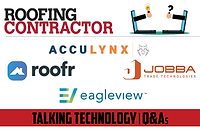ROOFING TECHNOLOGY
Talking Technology with Roofr
Rajiv Jhurani, Senior Vice President of Product for Roofr, joins the discussion about technology in the roofing industry today, how it’s helping roofing contractors and what’s trending for the future.


Rajiv Jhurani
Senior Vice President of Product, Roofr
RC: Please describe the state of the roofing industry right now and what tech’s role is within the space.
RJ: In today's economic climate, homeowners and businesses are understandably more careful about their spending. As a result, roofers need to adjust their business practices to serve their customers better.
Roofers must manage their expenses carefully, including investing in efficient roofing software and ensuring strong closing rates. They’ll also need to meet the higher standards that customers now expect when it comes to roof repairs or replacements, specifically by offering fast, digital and modern solutions in this rapidly progressing and competitive industry.
RC: How does Roofr fit into that discussion?
RJ: Roofr aims to be the one-stop shop for roofers. With Roofr, you can instantly get high-quality leads, measure roofs accurately and affordably, create job-winning proposals, and manage your CRM and business workflows in one place. This end-to-end software will allow roofing companies to provide better service to their customers and consolidate the technology they use, saving money and creating happier customers.
RC: With so many technology choices in the marketplace, how do roofers best assess the roi?
RJ: Roofers should audit their entire tech stack to understand where their value is coming from. Are the tools they use affecting key KPIs such as revenue, speed to lead, and close rate? Are the technologies working cohesively together to enable efficient business operations without friction? By understanding the impact of their technology, roofers can make more informed decisions about which tools to invest in and which ones to let go of.
RC: What areas of tech are growing in roofing?
RJ: In recent years, the marketplace has shifted toward tools that require fewer in-person touchpoints. This is clear in the widespread adoption that we’ve seen of digital roof measurement and proposals. These tools enable roofers to streamline sales and provide consumers with the fast, digitized experience they desire.
RC: Where can technology make the biggest impact in roofing?
RJ: Helping roofers win more business while providing a delightful customer experience is where we see most innovation happening. For example, offering instant estimates via your website, social media, or door hangers can improve business awareness and generate new warm leads. Building job-winning proposals that live natively in your CRM can improve close rates and operational efficiencies.
RC: Complete this sentence and then explain: roofers may regret not immediately _____________ regarding technology.
RJ: If you have a roofing company and you're not using a platform made just for roofing businesses, it's a good idea to start now. If you're already using technology, choose a software that's a top choice in the industry and will give you the most benefits based on your goals and challenges to help you succeed in your business.
RC: What makes you feel optimistic about using and adopting technology in roofing?
RJ: We believe that homeowners will expect a modern experience using technology from their roofing contractor. As a result, we anticipate that most roofing companies will adopt technology to power their business and meet those customer expectations.
RC: What will the roofing tech landscape look like in five or 10 years? Will we recognize the industry?
RJ: We believe consumers will expect a digitized, world-class experience throughout the roof replacement [lifecycle]. From the moment they interact with the roofer's website to the final payment, they will want to be kept informed and execute everything digitally throughout the project, ensuring their home is protected with a well-built roof.
Looking for a reprint of this article?
From high-res PDFs to custom plaques, order your copy today!





